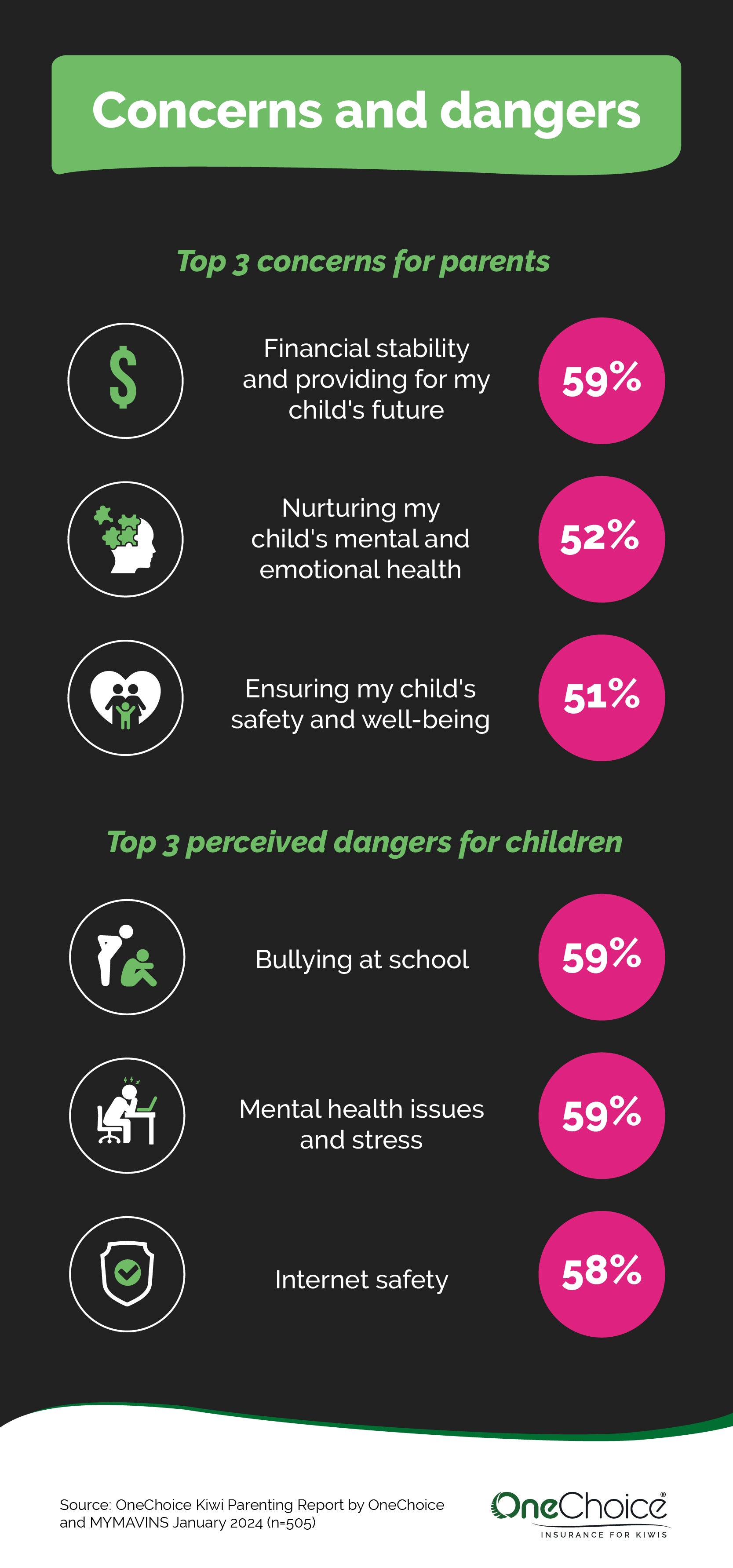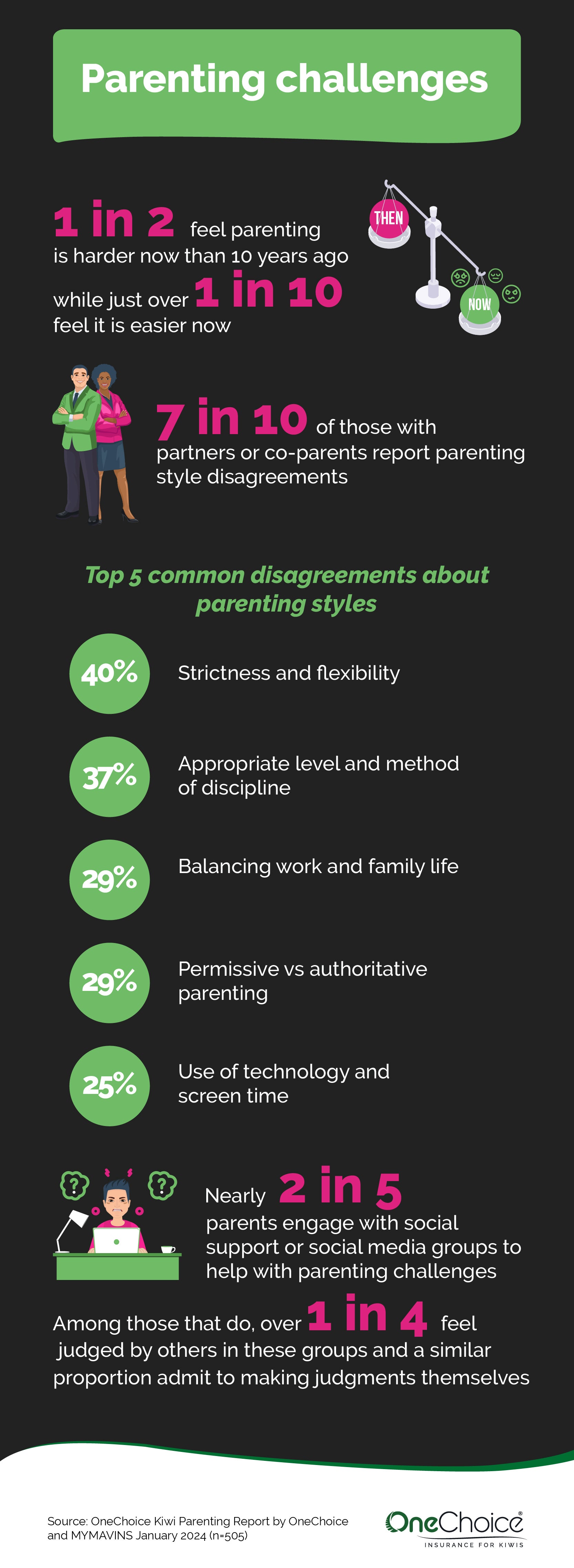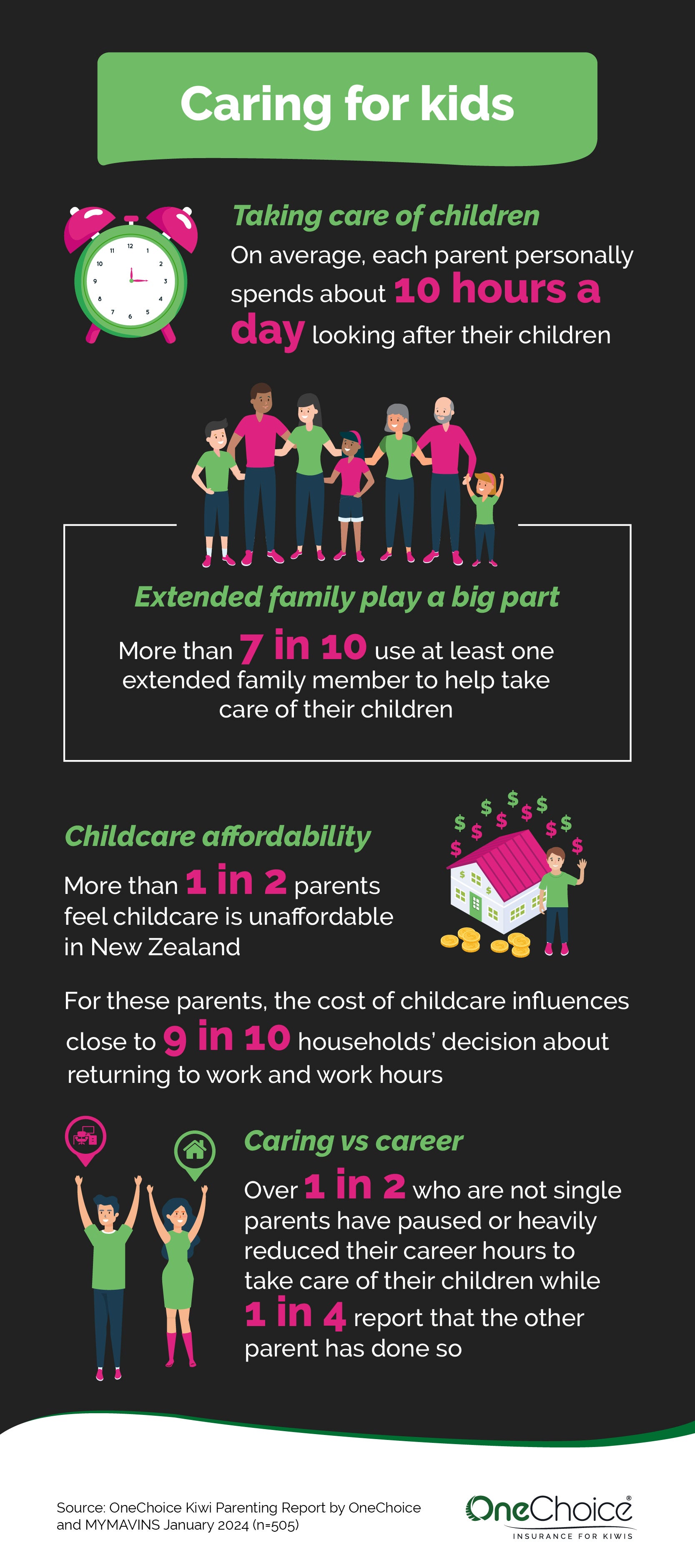The Kiwi Parenting Report 2024
Raising children is no easy feat and being a parent in New Zealand today seems a lot harder than it used to be.
The Kiwi Parenting Report 2024, commissioned by OneChoice in partnership with research group MyMavins, surveyed over 500 Kiwi parents about their approach to parenting in today’s world, ranging from those with newborn babies' through to children up to 17 years of age.
Between cost-of-living pressures, how to balance work and family life, and helping our digital native kids navigate social media, it can feel like we have our hands full in 2024. In fact, just over half (51%) of us feel that parenting these days is more demanding than it was a decade ago.
Parenting challenges
As parents, we only want the best for our kids. The past few years have thrown many curve balls at us – from a global pandemic and economic uncertainty to the impact of technologies like social media and artificial intelligence – so it’s only natural we’re wary of potential dangers and risks to our children’s well-being.
Family finance
Under the mounting cost-of-living pressures, it’s no surprise that the financial stability of our family is playing on our minds, with nearly three in five (59%) of us ranking this as our greatest overall concern for our children’s future. With the vast majority (89%) of households being impacted by the rising cost-of-living, as many as three in ten (31%) of us currently feel worried about our kids’ financial future.
Health and well-being
Meanwhile, an inward focus on our own health and well-being in recent years has also made us more in tune with our family, with the mental and emotional health of our kids (52%), and their general safety and well-being (51%) also amongst our biggest worries. When it comes to mental health, almost two-thirds (62%) believe social media plays a key role in shaping our children’s self-esteem and body image. Outside of the safety net of the home, we’re also worried about our kids’ well-being at school, with the majority ranking bullying as our top concern on the playground (59%).

While more than half (55%) of us are confident about our kids’ future career prospects, we’ve got mixed feelings about the current Kiwi job market compared to a generation ago. Namely, while 39 per cent of us feel it’s somewhat better than it used to be, 31 per cent of us believe it’s gotten worse. Interestingly, as we strive to improve our own balance between work and play, many of us share the same worries for our kids in their future careers, with high stress levels (20%), work-life-balance (20%), and physical and mental health impacts (18%) being the most common concerns on this front. We’re also divided about how artificial intelligence will impact the next generation of the Kiwi workforce, with a third (33%) anticipating an overall positive effect and a fifth (20%) expecting an overall negative effect, while 44 per cent predict we’ll see a mix of both.
Talking tough topics with kids
In good news, many of us are tackling our fears head on and taking active steps to shield our kids from our biggest concerns.
When it comes to financial security, many of us are having open conversations about money with our kids at home, involving them in our decision-making around spending (22%) and educating them about finances (30%). In fact, the majority of us hope to teach them useful lessons around budgeting and saving (62%), as well as starting savings accounts for them (56%).
Those of us with kids over the age of five are also actively engaging them in discussions about bullying and peer pressure (55%), physical health and wellness (53%), and the friends they spend time with (51%). The most common strategies include teaching them about self-acceptance and self-love (48%) and fostering open communication about body and self-esteem issues (45%).
Mums are more likely than dads to take the lead on these discussions, especially when it comes to sexual health and development, where 45 per cent of mums start the conversation compared to just 14 per cent of dads.
Beyond the home, the majority (71%) agree that sex education should also be taught at school, with over half (53%) of us supporting education around diversity and the LGBTQIA+ community in both settings.
According to leading paediatric psychologist, Clare Rowe, the current cost of living pressures on Kiwi households are actively shaping parenting styles in New Zealand. "Increasing financial worries among parents are leading to more frequent conversations with children about saving, budgeting for family activities, groceries, and investing in their futures. This financial strain not only influences the practical aspects of family life but also introduces a level of economic awareness and responsibility to children from a young age, potentially impacting their views on money, security, and priorities."
Raising the next generation: Family units and parenting styles in 2024 and beyond
A set of new challenges and concerns in today’s world means many of us are re-thinking our approach to raising children. In fact, different parenting styles in 2024 are as varied as the families themselves.
The most common (43%) parenting style in Aotearoa is a balanced approach, setting boundaries while giving children their independence. Traditional values still hold sway for some of us, with 14 per cent focusing on teaching our kids respect and discipline. A smaller proportion adopt an authoritative parenting style (11%) combining clear rules with support, while fewer parents identify with strict authoritarian (3%), highly involved helicopter (2%), or free-range (7%) parenting styles these days. Interestingly, as many as seven in ten parents or co-parents disagree on their parenting styles, particularly when it comes to strictness and flexibility (40%), disciplinary methods (37%), and balancing work and family life (29%).

Notably, many of us acknowledge that the way we were raised by our own parents has a significant impact on our approach to parenting our kids. In fact, 40 per cent of us believe our own parenting styles are either completely or highly influenced by our own parents, while 39 per cent of us are using a blend of our upbringing and our own methods.
While half (49%) of Kiwi families today resemble the traditional idea of a nuclear family, many households are taking new and diverse shapes. As many as 11 per cent of families describe themselves as blended, and 10 per cent have co-parenting arrangements, while single-parent households and extended families each make up 13 per cent of households.
Childcare
As the affordability of childcare becomes a growing concern for over half (56%) of us, the way we divvy up caring responsibilities within these family arrangements is also shifting. As many as 71 per cent of us are now recruiting the help of our extended family members including grandparents (61%), aunties and uncles (30%) and cousins (13%).
On average, we each spend approximately 10 hours a day looking after our kids, but women tend to take on the heavy lifting. As many as two-fifths (39%) of women dedicate 16 hours or more daily, underscoring the challenges faced by mothers balancing career and parenting responsibilities, leaving only eight hours for any other activities, including sleep. Meanwhile, fewer than 1 in 10 men (8%) are spending the same amount of time caring for their children, highlighting the gender gap at home.

How to balance work and family life?
Balancing work with family is a big priority for many of us, and many of us are taking advantage of parental leave and flexible working arrangements to juggle taking care of the kids. After spending on average 26 weeks on parental leave, only a third (33%) of new parents are returning immediately to full time work, with a significant proportion of us choosing part-time or casual roles. On an optimistic note, 85% of parents have found their workplaces accommodating and flexible.
As we tackle the challenge of raising the next generation of Kiwis together, let’s keep the conversation going to strive for a better future for our whānau and community. Discover more findings and insights in the Kiwi Parenting Report 2024.
22 Apr 2024
